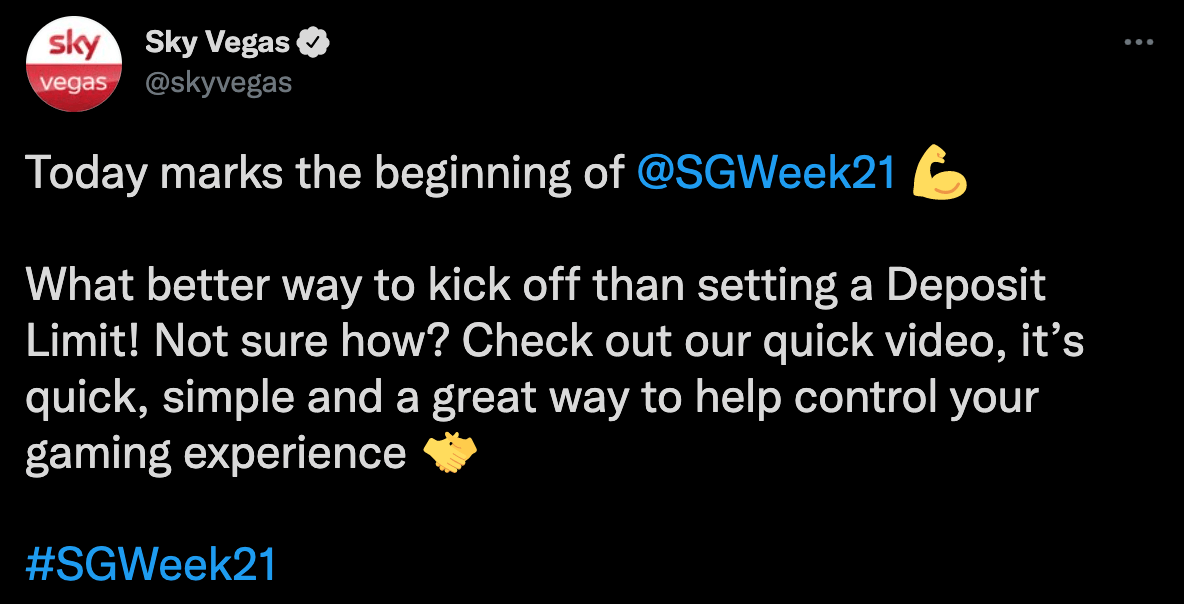

This November, we have seen the return of Safer Gambling Week for its fifth year. Organised by several trade associations involved in the gambling industry, the week is supposed to be all about raising awareness of problematic gambling habits and starting a dialogue between operators and customers about how to keep an eye on their gambling.
So far this week, you might have seen gambling companies making a big noise on social media and on TV about the importance of safer gambling tools, like setting deposit limits and timeouts.
The more cynical observer might wonder whether this is simply an attempt by the gambling industry to get some good press. Interviewed ahead of this year’s Safer Gambling Week, campaign director Deborah Roil stressed that this was not the case, saying: “I want to make it clear that this is a campaign not about throwing money at advertising.”
But take a closer look at how operators are actually conducting themselves versus what is being said and the mask starts to slip. For all the intensive publicity about helping people control their gambling, it seems very clear that as far as many operators are concerned, this week is simply business as usual — and that for them, the Safer Gambling Week campaign is indeed no more than a hypocritical publicity exercise.
Advertising vs reality
Last month, BGO Entertainment, the operator behind popular sites like BGO, Power Spins and Chilli Casino, had its licence suspended by the Gambling Commission after the latter found it to have breached its obligations under the Gambling Act 2005.
The Commission specifically mentioned ‘Failure to protect consumers’ as its main consideration in deciding to suspend the licence. In effect, failure to notice evidence of problem gambling and failure to take action accordingly.
This wasn’t the first time that BGO had been taken to task by the Gambling Commission. Only last year, it was forced to accept restrictions on its licence and pay a £2m fine for similar failures.
Looking back through the official BGO Twitter feed, you can see that the company was making some effort to promote its safer gambling guidelines in the run-up to Safer Gambling Week. Or rather, a very minimal effort. Its social media campaign to promote safety measures seems to have been a strategy of simply Tweeting the same image every week along with a standard caption about the importance of setting deposit limits. Evidently, the prevailing attitude among the BGO team was that if they were seen to be making the right noises about encouraging safer gambling, they would never have to worry about actually paying attention to the issue.

While at the time of the suspension BGO posted an update on its website saying it was “working with the Gambling Commission to resolve this situation quickly”, visitors to the site are now greeted with the news that the operator has surrendered its licence.
This could mean a few things: BGO may be unable to pay its fine, it could somehow lack the tools to put a new safer gambling policy into place, or it has decided that the UK market isn’t worth the cost and effort to keep the UKGC happy. If the latter is true, then it sends a pretty clear signal about its commitment to protecting its clients.
In fact, BGO’s sister site 7Casino, which operates under an Alderney Licence, is still available to customers outside the UK. If there’s no strong obligation to comply with certain regulatory requirements, an operator can simply act as it pleases. ‘Safer gambling’ simply becomes a meaningless buzzword.
A similar case to this one occurred about a month beforehand when EULotto, operator of popular lottery betting site Lottoland, was hit with a fine of £760,000 for issues including social responsibility failures.
The Gambling Commission’s investigation found that if customers got in touch about concerns relating to safer gambling, they were simply sent the same regulation email with a list of the tools available to them.
If we take a look at the Lottoland website though, there are fairly detailed explanations of safer gambling tools, with videos explaining each one. If the site’s operator was found wanting even, then promoting a safer gambling policy seems like a pretty fruitless exercise.
Sky Vegas: gambling with users’ wellbeing
There is plenty of evidence for operators talking the talk about responsible gambling but not following through with actions. But this year in particular, one case has shown up the hypocrisy shown during Safer Gambling Week like nothing else before.
The team over at Sky Betting and Gambling, responsible for running platforms including sports betting site, Sky Bet and online casino, Sky Vegas, have clearly been keen to show their enthusiasm for Safer Gambling Week this year.
On the Sky Bet Twitter page, promotional videos talking up the benefits of setting deposit limits are interspersed with videos retweeted from the official Safer Gambling Week account. It’s the same on the Sky Vegas account, with Tweets offering tips on the best ways to protect yourself.

It’s all presented in a manner that seems playful and yet professional: a cheerful, trustworthy voice of reason advising customers about how they can rely on gambling sites to help them protect themselves.
“We want people to make informed choices,” says one Tweet. On a general level, too, the Sky operators always seem keen to tout their safer gambling credentials. The dedicated Safer Gambling page on the Sky Bet website opens with the declaration that “The wellbeing of our customers is our top priority 365 days a year.”
Visiting the Sky Vegas website, the option to ‘Set a limit in under a minute’ features prominently at the top of the page. All the signs seem to point towards a company that is seriously committed to encouraging its customers to gamble responsibly.
How ironic, then, that this week of all weeks, Sky Vegas sent out emails to customers offering free spins on its slot games — and not to its regular customers, but to players who had made the decision to self-exclude from the platform. Among these people, needless to say, were recovering gambling addicts. With the subject line “Take a peek at what your mystery bonus is”, the emails encouraged players to sign up to the website and start gambling.
An online casino will always want to keep its members coming back by sending out promotional offers. But if Sky Vegas has been targeting players who have recognised their own problematic habits and taken action to avoid gambling as a result, then that torpedoes any claim it might make to genuinely care about its users’ wellbeing. It’s not rocket science to grasp the fact that self-exclusion tools are meant to keep people away from gambling sites. If they don’t do that, then what is the point in those sites promoting them?
As one self-excluded member who received an email commented: “They shouldn’t be targeting anyone, let alone people who’ve told them they have got a problem with gambling and it could be triggering. That it’s happened during Safer Gambling Week is perverse.”
With this incident, one operator has seriously undermined the credibility of Safer Gambling Week. For the three trade bodies running Safer Gambling Week, this is a major embarrassment. Sky Betting and Gambling can definitely expect an investigation by the Gambling Commission soon. It will also be interesting to see if it makes a significant impact on the government’s review of the Gambling Act 2005 that was announced last December by the Department for Digital, Culture, Media and Sport.
In light of this incident, maybe it’s not just the behaviour of their customers that operators ought to be keeping an eye on, but their own.
An industry perspective
News like this might well make you wonder: just how committed are online gambling providers to protecting their customers? What good is it to run things like Safer Gambling Week when companies are showing such flagrant disregard for its aims?
To examine these issues further, we sat down with James Booth, Head of Acquisition at online casino MrQ, to discuss operators’ approaches to safer gambling. Launched in 2018, MrQ prides itself on its ‘no nonsense’ business-to-consumer approach — so how does this inform its safer gambling policy?
OnlineBingo.co.uk: James, thanks so much for taking the time to talk to us. MrQ places a lot of emphasis on an honest relationship between the company and customers with your focus on ‘No wagering and no nonsense’. How does this translate across to your responsible gambling policy?
James Booth: Our entire business has been built on the concept of ‘sustainable gambling’. We see ourselves as an entertainment platform where fun is much more important than life-changing jackpots. Keeping our customers happy and engaged is where the ‘no wagering’ policy and simplified terms and conditions come in. Our responsible gambling policy follows suit, with an over-cautious approach to ensuring customers can afford to play and also enjoy their time on site. It can sometimes feel invasive and cause more friction than we’d like when it comes to checking affordability but we’ve taken the decision as a business that player safety comes before profitability.
OB: How do you ensure effective monitoring of customers’ habits? What things do you look out for?
JB: As an operator we accept that player safety is just as much our responsibility as it is the players’, so while we, of course, give players the power to take control with the likes of time-outs, exclusions and limits, we put pressure on ourselves to constantly develop technology to intervene where we need to. We’re currently using machine learning to understand behaviour more and more each day and with this knowledge we make decisions on when, where and how often to step in to ensure our players are comfortable. While there are hundreds of data points, we look carefully at frequencies of bets, ratios of deposits vs wager amounts, time on site and habitual trends.
OB: Do you have a dedicated member of staff or team in charge of this?
JB: While we have senior figures in the business dedicated to player safety, the responsibility is shared among everyone. From marketing teams, to data scientists and of course customer service. Everybody attends regular training courses whether it directly affects their role in the business or not.
OB: In your view, does Safer Gambling Week actually do much to raise awareness of safer gambling tools?
JB: I feel that while it does a job in spreading the word and forcing the industry to think about responsible gambling, it often feels like a token gesture. All operators send out the same communications, with the same messages to all of their players, whether they display signs of problem gambling or not. For me, responsible gambling needs to be central to every player interaction, all year round. We have a responsibility to clean up our own industry and the only way to do that is to start valuing player safety with the same emphasis as making profit.
What does the future hold for Safer Gambling Week?
Even if the organisers behind Safer Gambling Week are well-intentioned, the event’s chances of being taken seriously are being severely damaged by gambling companies’ failure to live up to the high standards expected of them. This week’s shocking incident involving Sky Vegas highlights the importance of being vigilant when signing up to an online casino.
Of course, public awareness of safer gambling tools is vitally important. But if operators are not meeting their customers halfway and acting appropriately where they need to, Safer Gambling Week might as well never be held again. If no lessons are learned, then the week will remain what its organisers insist that it is not: a campaign that simply involves throwing money at advertising.
If you’re looking for advice about how to gamble safely, you can always check out our regularly-updated responsible gambling guidelines for all the essential information. You can also read our guide on how gambling operators should protect you to get a better idea of what measures gambling companies should have in place to protect customers.





